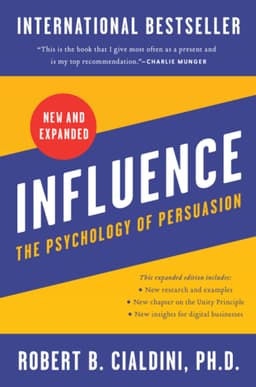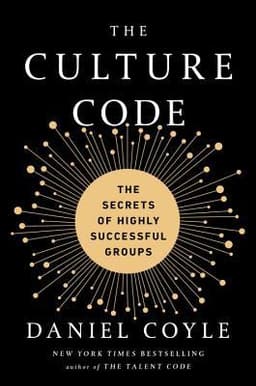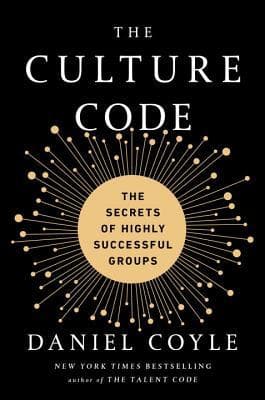
Influence Book Summary
The Psychology of Persuasion
Book by Robert Cialdini
Summary
Influence is the quintessential guide to the six universal principles of persuasion - reciprocation, commitment and consistency, social proof, authority, liking, and scarcity - that shape our decisions and behavior, often without our conscious awareness.
Sign in to rate
Average Rating: 5
In his renowned book, Influence: The Psychology of Persuasion, Dr. Robert Cialdini presents a comprehensive analysis of the psychological forces that govern human compliance.
Cialdini identifies six fundamental principles of influence: reciprocation, the obligation to repay favors and gifts; commitment and consistency, our desire to align our actions with our stated beliefs and values; social proof, our tendency to follow the lead of similar others; liking, our acquiescence to those we know and like; authority, our deference to credible experts and leaders; and scarcity, our heightened desire for rare and dwindling resources. Cialdini explores each of these principles in depth, revealing their evolutionary roots, their cultural manifestations, and the ways in which they are leveraged by compliance professionals such as salespeople, marketers, and fundraisers.
Click, Whirr - Our Automatic Responses to Influence
Cialdini introduces the idea that humans, like animals, have automatic, instinctual responses to certain stimuli or "trigger features". He calls this "click, whirr" - when a trigger is activated, it "clicks" and then we automatically "whirr" into the corresponding behavior or action, without consciously thinking about it. Compliance professionals can exploit these automatic responses to influence us.
Section: 1, Chapter: 1
The Rule of Reciprocation - An Unwritten Social Contract
The rule of reciprocation states that we feel obliged to repay in kind what others have provided us. If someone does us a favor, we feel indebted to do something for them in return.
- This is a powerful rule that exists in all human societies
- It allows for unequal exchanges to happen, trusting the debt will be repaid
- It builds trust, community, and stable social structures for sharing resources
Section: 1, Chapter: 2
How a 'Free Gift' Exploits the Reciprocity Rule
The Hare Krishna society leveraged the reciprocity rule to get donations:
- In airports, they would give people a 'free gift' - a book or flower
- Though the gift was not requested, it still triggered a feeling of indebtedness
- When they then asked for a donation, people felt compelled to reciprocate
- Even those who didn't want the gift often made a donation just to relieve the sense of obligation Using unsolicited gifts is an effective way to exploit the automatic reciprocity response.
Section: 1, Chapter: 2
Use the Reciprocity Rule to Your Advantage
You can leverage the reciprocity rule in your favor:
- Proactively do favors and provide value for others
- They will feel a sense of indebtedness and want to repay you
- This makes them more likely to do what you request later
- But beware of those who purposely use this to manipulate - recognize when gifts have strings attached
Section: 1, Chapter: 2
Our Obsessive Desire to be Consistent
Cialdini introduces the consistency principle - our drive to be and appear consistent in our words, beliefs, attitudes and deeds.
- Inconsistency is generally viewed as an undesirable personality trait
- Being consistent is associated with logic, rationality, stability and honesty
- Once we make a choice or take a stand, we feel both interpersonal and intrapersonal pressure to act consistently with that declaration
- We like to justify our earlier behavior by making subsequent choices that fit with it
Section: 1, Chapter: 3
The Power of a Public Commitment
An experiment demonstrated how publicly committing to a stance leads to consistent future behavior:
- Researchers went door-to-door, asking people to place a large public service billboard on their front lawn
- Most refused this extreme request. But a subset had previously signed a petition supporting the cause - they were far more likely to comply
- Those who had publicly signed on to the initiative felt compelled to act consistently with that stance, even weeks later
- The more public the initial commitment, the more pressure to be consistently compliant later
Section: 1, Chapter: 3
Small Voluntary Commitments Open the Door to Bigger Requests
Salespeople and marketers leverage the principle of consistency to make bigger sales:
- Start by getting the prospect to make a small, easy commitment
- This could be agreeing to fill out a survey, accept a free sample, or make a statement supporting the product
- Later, pivot to making a related larger request, like buying a subscription
- They feel internal pressure to act consistently with their earlier commitment
- To resist unwanted influence attempts, be very careful about making commitments you don't want to be held to later
Section: 1, Chapter: 3
The Principle of Social Proof
Cialdini introduces the principle of social proof - we look to the actions of others, especially similar others, to determine appropriate behavior for ourselves.
When uncertain, we assume others' actions reflect the correct behavior for that situation. This is usually a reliable shortcut - if everyone else is doing it, it's probably the wise thing to do. But this heuristic can be hijacked, leading us astray or making us easy to manipulate
Section: 1, Chapter: 4
The Tragic Tale of Kitty Genovese
In 1964, Kitty Genovese was brutally attacked and murdered while 38 witnesses heard her cries - but not one intervened or even called the police. This infamous case highlighted the "bystander effect."
- Cialdini explains this inaction as partly a failure of social proof under uncertainty
- With many bystanders, each individual looks to see how others are reacting
- Seeing everyone else's apparent passivity, they conclude the situation must not actually be an emergency
- Pluralistic ignorance snowballs and no one acts
- This explains the bystander effect better than the common "apathy" explanation
Section: 1, Chapter: 4
Liking - The Friendly Thief
The liking principle states that we prefer to say yes to people we know and like. Compliance professionals utilize these factors so that we will like them and want to say yes. Factors that influence liking include:
- Physical attractiveness
- Similarity to us
- Compliments
- Familiarity through repeated contact
- Positive associations
- Cooperating towards mutual goals
Section: 1, Chapter: 5
Tupperware Parties - Leveraging Liking for Profit
Tupperware built a massive MLM empire on the liking principle. What began as a way for 1950s housewives to earn money is now a multibillion-dollar global enterprise:
- Home party hosts invite friends to a "Tupperware party"
- The host demonstrates products and takes orders, receiving a cut of the sales
- Guests feel obliged to make a purchase since the host is a friend doing them a "favor"
- Tupperware reps know sales are driven more by friendship than product quality
Section: 1, Chapter: 5
The Milgram Experiments - A Shocking Discovery About Obedience to Authority
Stanley Milgram's famous experiments at Yale tested obedience to authority to an unsettling degree:
- "Teachers" were instructed to give increasingly severe electric shocks to a "learner"
- The shocks weren't real, but the teachers thought they were
- Over 60% of subjects fully obeyed the experimenter and continued to the highest voltage, even with the learner screaming in agony
- Subjects were everyday people deeply distressed by their actions, but they still obeyed
- Shows the immense power of authority - and the human capacity for cruelty under its direction
Section: 1, Chapter: 6
Scarcity - The Rule of the Few
The scarcity principle states that opportunities seem more valuable when they are less available. Items and opportunities are more desirable when they are rare, dwindling or difficult to obtain
This is a widely used weapon of influence - advertisers emphasize scarcity to drive demand
- Scarcity works on the pain of "loss" - we don't want to miss out or lose access to something
- It especially affects us when we perceive we are losing freedoms we previously had
Section: 1, Chapter: 7
The Cookie Study - How Scarcity and Rivalry Increase Desirability
A study demonstrated the powerful effects of scarcity and rivalry:
- Subjects were given a cookie jar and asked to rate the cookies
- For some, there were many cookies; for others only two
- Subjects rated the scarce cookies as more desirable - even though they were identical!
- Those who thought scarcity was due to high demand rated them even higher vs accidental scarcity
- Perceived rivalry plus scarcity is a potent combination
Section: 1, Chapter: 7
The Proliferation of Information and the Rise of Mental Shortcuts
In our fast-moving, information-saturated world, we increasingly rely on mental shortcuts to navigate our choices:
- The proliferation of information means we often can't take the time to analyze each decision thoroughly
- Instead we rely on judging a single factor according to these weapons of influence
- While this is often a useful and necessary shortcut, it leaves us vulnerable to those who would exploit it
- Compliance professionals can hijack these powerful triggers for their own gain
Section: 1, Chapter: 8
Related Content


The Culture Code Book Summary
Daniel Coyle
The Culture Code reveals the secrets of highly successful groups, showing that the key to unleashing a team's full potential lies in creating a culture of safety, shared vulnerability, and purpose.
The Culture Code reveals the secrets of highly successful groups, showing that the key to unleashing a team's full potential lies in creating a culture of safety, shared vulnerability, and purpose.
Leadership
Management
Business

